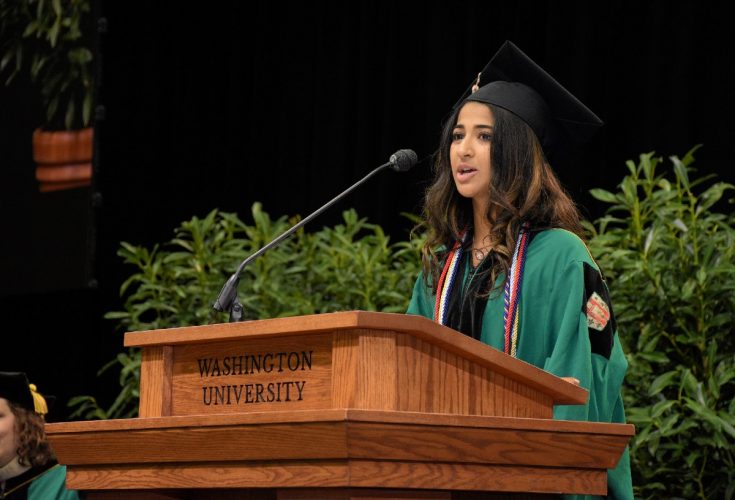Olin students looking to get a jump on business ownership can access a WashU program that channels their entrepreneurial energy into on-campus stores or services. The Student Enterprise Program (StEP) offered through the Skandalaris Center for Interdisciplinary Innovation and Entrepreneurship helps students put their business education to work in an immediate, hands-on way.
Through StEP, students can propose business ideas, apply for business loans and operate on campus, even renting storefront space on the South 40.
Student owners say the program provides practical use cases of their business education. “It’s fascinating how all these things I’m learning in class are being demonstrated in this store,” said Spring Zhou, BSBA 2026. Zhou owns Gallery 314, which offers hand-crafted gift items by WashU students and St. Louis makers.
Other current StEP businesses include several food providers, a student-run laundry business and Bears Bikes, a bike rental/storage/repair business.
When student owners graduate, they sell their shares of the businesses to younger students.
“The business ideas serve the WashU community—students, faculty and staff,” said Gabe Breternitz, venture development specialist for Skandalaris. “They’re meant to be ideas that will stay here and get passed down. A common feature is the buying and selling of businesses.”
Seeking investors

Bears Bikes, which has operated since 2004, is among the StEP enterprises seeking new investor-owners. Eashan Kothari, BSBA 2024, bought a share as a freshman and is looking for an owner to take it over once he graduates in December.
The bike company’s ownership structure ensures there are always experienced owners in place. Departing seniors typically sell their shares to first-year students. “I’m trying to bring someone on early to help mentor them before I graduate,” Kothari said.
Zhou is the only owner of Gallery 314. She also is looking for investors, since she plans to study abroad. “I need someone here to be in charge then,” she said.
StEP has several avenues to assist business owners, Breternitz said. A loan program provides up to $10,000 to start a new business or purchase a share in an existing one, at favorable rates. StEP holds workshops on accounting, marketing and other important skills. Zhou, an international student, said the program helped her find legal assistance to take over Gallery 314 because she lacked a Social Security number.
The program’s advisory board includes Olin faculty and staff who provide specialized guidance. Mark Soczek, director of Olin’s Master of Accounting program and a senior lecturer in accounting, recently joined the board. “A lot of organizations were wrestling with accounting issues, including valuations (of businesses being sold),” he said. “They thought it would be valuable to have someone on the board who could help with that.”
Breternitz said his office offers support, but otherwise prefers to be hands-off and let the students lead. “Everything is handled by the students—that makes it a more valuable learning experience,” he said. “We have rules in place to keep it fair and equitable.”
Hard numbers and soft skills
Both Zhou and Kothari said owning their businesses has enhanced their education—and vice versa.
Zhou said her experience buying Gallery 314 piqued her interest in the legal aspects of running a business. She’s pursuing a minor in legal studies and in her business law classes, “I felt very confident speaking about my situation, and the things I did when I was acquiring the business.”
Kothari said his classes have helped him keep good financial records at Bears Bikes. “When we’re selling the business, we have to release all the financials—discounted cash flows, revenue projections. All those things are the core foundation of our classes.”
Soczek said that StEP entrepreneurs deal with business issues that might not arise in class. “It may seem glamorous to start a business, but then the onus falls on you to operate it,” he said. “Soft skills—managing your space optimally, handling differences of opinion with other owners—those are particularly important.”
As Kothari prepares to pass on his share of Bears Bikes, he anticipates making roughly what he paid for it nearly three years ago. This is in addition to the share of the profits he has been receiving each year.
“Overall, the experience I got was way more valuable than any money I could have made from the business,” Kothari said.
The StEP program offers two workshops for aspiring student entrepreneurs: a Starting a Business session on October 11 and a Buying a Business workshop on October 25, both from 4 to 5 p.m. Registration is required.
Main photo: Spring Zhou, BSBA 2026, owns and operates Gallery 314, a gift shop on the South 40. The store is one of many student businesses operated through StEP.
Second photo: Eashan Kothari, BSBA 2024 (front row, left), and his three co-owners of Bears Bikes outside their store.









